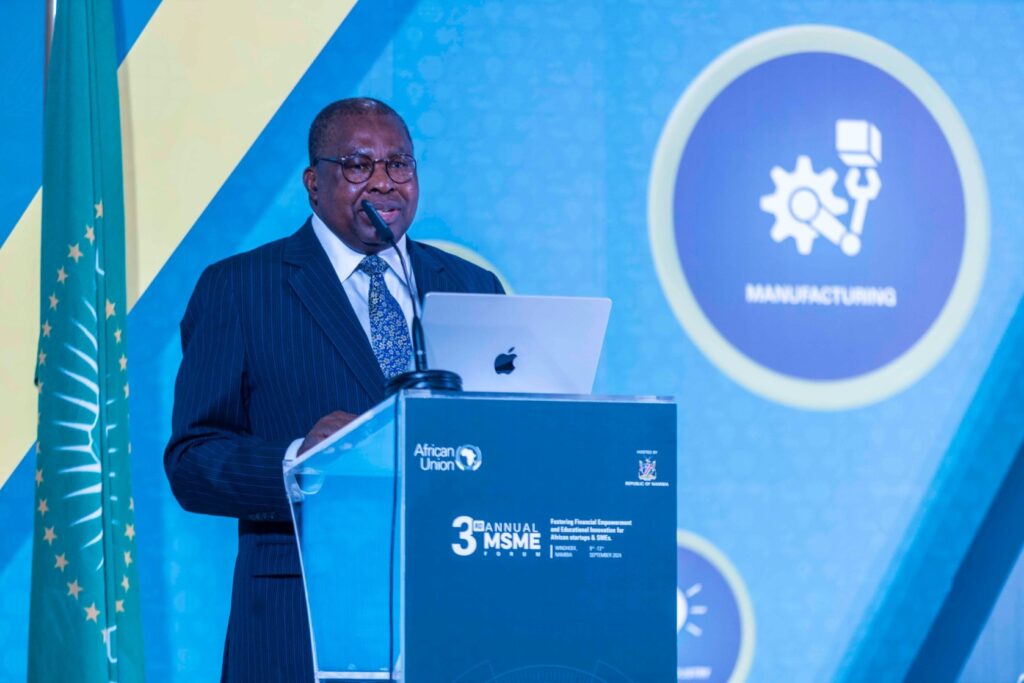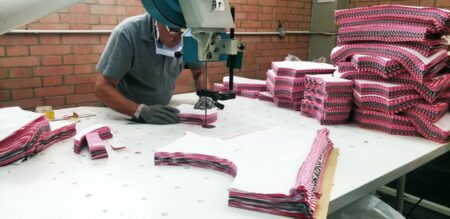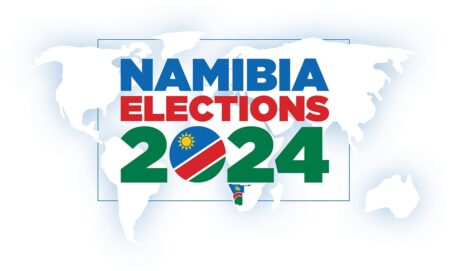- Small scale firms in Africa urged to embrace technology, research, and development to power their growth at scale.
- African MSMEs have been challenged to tap opportunities presented by the African Continental Free Trade Area (AfCFTA) Agreement.
- Agriculture, manufacturing, ICT, minerals, and creative industries highlighted as sectors that have huge potential for MSMEs’ growth.
The African Union (AU) has called upon startups and micro, small, and medium-sized enterprises (MSMEs) across Africa to harness the power of innovation for their growth and sustainability. This appeal has been made by Albert Muchanga, the AU Commissioner for Economic Development, Trade, Tourism, Industry, and Minerals during the third African Union Micro, Small, and Medium-Sized Enterprises Forum, which is taking place between September 9 to 13 in Windhoek, Namibia, and virtually.
This forum, which is arguably one of Africa’s largest gathering of MSMEs, focuses on the theme: “Fostering Financial Empowerment and Educational Innovation for African Startups and MSMEs.”
Innovation as a catalyst for SMEs growth
Muchanga urged African MSMEs to scale their businesses beyond the micro and small enterprise stages, adding that there are huge benefits presented by the African Continental Free Trade Area (AfCFTA) Agreement. According to Muchanga, the AfCFTA presents African businesses with unprecedented access to a single market of over 1.3 billion people. This opportunity is not only a chance for regional growth but a gateway to the global economy.
Muchanga advised MSMEs to embrace technological advancements, research, and development as key drivers for innovation. “Innovation is the mainstay for future growth and business expansion.” He noted that for African startups to be competitive on a global scale, they must prioritize research and development (R&D). By embracing R&D, MSMEs will develop unique products, improve service delivery, and solve pressing challenges, ultimately foster sustainable growth at scale.
AfCFTA: A gateway to prosperity for African MSMEs
The AU commissioner encouraged African entrepreneurs to look beyond domestic markets and tap into opportunities presented by the AfCFTA. With AfCFTA’s expansive trade constituency, MSMEs can explore cross-border trade without the traditional barriers that have historically hampered African businesses. This agreement has created a vast network that seeks to reduce tariffs, minimize trade barriers, while streamlining logistics.
Moreover, the commissioner highlighted the potential for African MSMEs to penetrate markets in major global economies, including China. “Global market penetration is no longer a distant dream for African startups,” Muchanga stated, pointing out the numerous trade partnerships that could benefit African businesses.
Targeting key sectors for expansion
This year’s AU MSME Forum identified key sectors that hold the greatest potential for MSME growth in Africa, including agriculture and manufacturing. The forum also highlighted information and communications technology (ICT), minerals, and the creative industries as sectors that have huge potential for growth. These sectors align with the AU’s Agenda 2063, a 50-year continental development blueprint designed to promote sustainable development and economic empowerment.
By focusing on these strategic sectors, the AU aims to empower African small businesses to not only drive economic growth but also foster job creation and long-term sustainability. Agriculture, for instance, remains a crucial sector for many African economies. With innovation, African MSMEs in agriculture can boost productivity, develop value-added products, and enhance food security across the continent.
In the manufacturing sector, African MSMEs are encouraged to explore new technologies such as automation and digitalization to improve efficiency and output. The ICT sector, with its exponential growth, presents endless possibilities for startups to innovate, from mobile applications that improve financial inclusion to cloud solutions that streamline operations.
Read also: Africa’s quest to unlock trillion-dollar food economy potential
The role of capacity building and networking
Muchanga also cited the importance of the AU MSME Forum as a platform for capacity building and networking. The forum, which brings together policymakers, industry experts, and entrepreneurs, serves as a space for knowledge sharing and collaboration. It provides MSMEs with the tools and insights necessary to navigate the complexities of the African business landscape.
The high-level event featured several panel discussions and workshops on topics such as accessing green financing, balancing quality and innovation, and promoting digital and financial literacy. These sessions aimed at providing MSMEs with practical knowledge on how to innovate effectively, scale their businesses sustainably, and improve their access to financing.
Green financing, in particular, was highlighted as a crucial enabler for MSMEs seeking to build environmentally sustainable businesses. African MSMEs were encouraged to adopt practices that not only contribute to economic growth but also minimize environmental impact.
Empowering MSMEs through educational innovation
Educational innovation also took center stage at the forum. African MSMEs were encouraged to invest in educational initiatives that enhance digital and financial literacy. Muchanga noted that equipping entrepreneurs with the skills to navigate the digital economy is essential for their success in an increasingly interconnected world.
Digital literacy, in particular, is vital for businesses looking to harness e-commerce platforms and tap into new markets. Financial literacy, on the other hand, empowers MSMEs to make informed decisions about investment, savings, and accessing credit.
As the forum draws to a close, it is evident that the future of African MSMEs lies in their ability to innovate, scale, and embrace opportunities under the AfCFTA. With the right support, capacity building, and financial empowerment, African MSMEs are poised to become significant drivers of economic growth and job creation across the continent.











